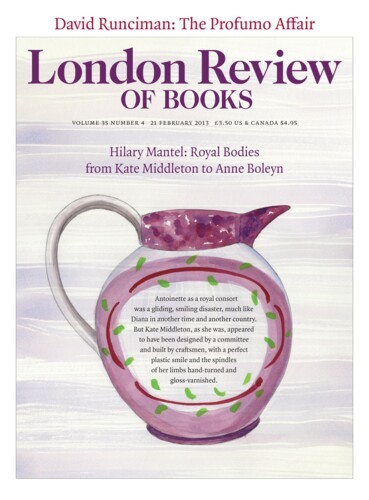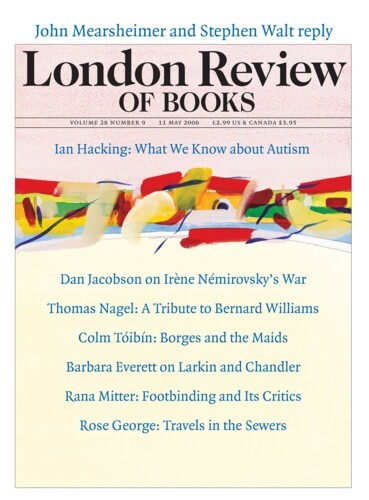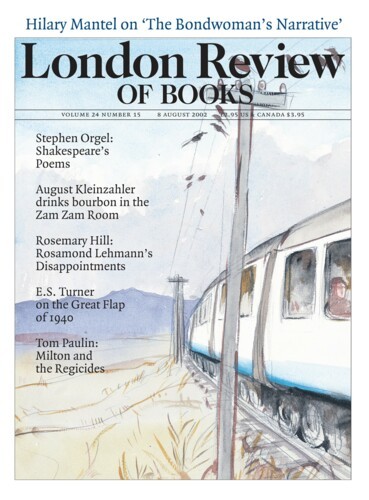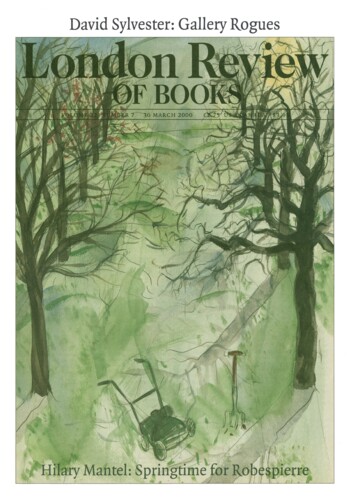Hilary Mantel
Hilary Mantel was the author of nine novels and three collections of short stories in addition to her prize-winning trilogy about Thomas Cromwell. She began to write for the LRB in 1987 and contributed more than fifty pieces to the paper on subjects ranging from some of the Tudors who appear in her trilogy (Jane Boleyn, Queen Mary, Charles Brandon and Margaret Pole) to some of the figures who appear in A Place of Greater Safety, her novel about the French Revolution: Danton, Robespierre (twice), Théroigne de Méricourt and Marie Antoinette. Royal Bodies, her Winter Lecture for the LRB, considered the public perception of royal women from Anne Boleyn to Kate Middleton: ‘we don’t cut off the heads of royal ladies these days, but we do sacrifice them.’ She also published several pieces of memoir in the LRB, on her childhood, the misdiagnosis of her endometriosis as mental illness, and the childlessness that was its result. Mantel Pieces: ‘Royal Bodies’ and Other Writing for the London Review of Books was published by Fourth Estate in 2020.
Do euphemisms help?
11 May 2006
Colonial Ills
8 August 2002
One of the Frightfulest
30 March 2000
Podcasts & Videos
Story: ‘The School of English’
Hilary Mantel
Hilary Mantel reads her short story, ‘The School of English’.
Royal Bodies
Hilary Mantel
Hilary Mantel delivers her lecture on the royal body, from Anne Boleyn’s ‘bosom not much raised’ to Kate Middleton’s equally modest endowment.
Pieces about Hilary Mantel in the LRB
Charm with Menaces: ‘The Mirror and the Light’
Colin Burrow, 19 March 2020
At moments Mantel might have heeded the words addressed by her Wyatt to Cromwell: ‘Be careful . . . You are on the brink of explaining yourself.’
On your way, phantom: ‘Bring Up the Bodies’
Colin Burrow, 7 June 2012
Bring Up the Bodies is not just a historical novel. It’s a novel with a vision of history that magically suits the period it describes. Its predecessor, Wolf Hall, the first part of what...
How to Twist a Knife: Wolf Hall
Colin Burrow, 30 April 2009
There was no shortage of bastards in the early 16th century, but Thomas Cromwell stands out as one of the biggest bastards of them all. His surviving correspondence shows the energy, efficiency...
The trouble is I’m dead: Hilary Mantel’s Fiends
Elizabeth Lowry, 19 May 2005
Hilary Mantel’s dark, unsettling and gleefully tasteless new novel about spiritualism, Hell and the condition of contemporary England is part ghost story, part mystery, and as alarmingly...
Freak Anatomist: Hilary Mantel
John Mullan, 1 October 1998
In the Council Room of the Royal College of Surgeons hangs the portrait by Joshua Reynolds of the 18th-century surgeon and anatomist John Hunter. It has been much darkened by the bitumen content...
The Little Woman Inside
Dinah Birch, 9 March 1995
Women of my age, born in the early Fifties and now in our forties, have reached the season of retrospection. We have become – or have not become – wives, wage-earners, mothers,...
A Form of Showing Off
Anna Vaux, 28 April 1994
‘If God knows our ends, why cannot he prevent them, why is the world so full of malice and cruelty, why did God make it at all and give us free will if he knows already that some of us will...
Falling for Desmoulins
P.N. Furbank, 20 August 1992
When Sarah Orne Jewett sent her friend Henry James a copy of her latest work, a historical novel entitled The Tory Lover, he told her it would take a very long letter to ‘disembroil the...
Looking for magic
Dinah Birch, 14 September 1989
It’s not long since the fairy story seemed the least political of genres. Not so today. A preoccupation with transformation and escape, coupled with a repudiation of the sober certainties...
You bet your life
Margaret Walters, 21 April 1988
Peter Carey’s Oscar and Lucinda is a tall story, as elaborate and fantastical as any of the yarns spun by the trickster hero of his last novel Illywhacker. For one thing, it’s a...
Belfast Book
Patricia Craig, 5 June 1986
The first of these writers, M.S. Power, has a searing metaphor to describe the effect of Ireland on certain people, those native to it and others: nailed to the place, they end up as in a...
Read anywhere with the London Review of Books app, available now from the App Store for Apple devices, Google Play for Android devices and Amazon for your Kindle Fire.
Sign up to our newsletter
For highlights from the latest issue, our archive and the blog, as well as news, events and exclusive promotions.




